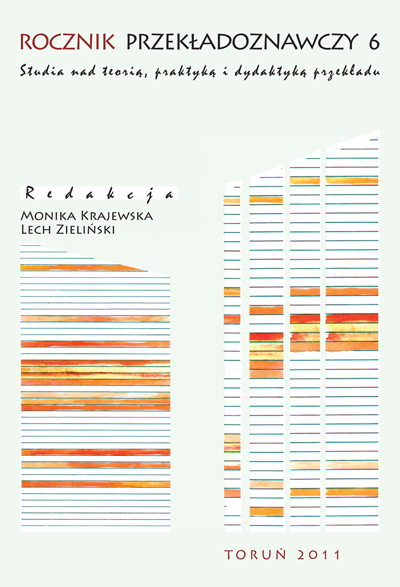Moving beyond the text – translation project as a tool of self-evaluation and refl exivity in the LSP-translation classroom: a case study
DOI:
https://doi.org/10.12775/RP.2011.011Keywords
translation evaluation, translation process, translation of special texts, translation project, EMTAbstract
The article addresses the issue of translation quality assessment (TQA), focusing on quality and assessment in the LSP-translation classroom. In the Polish context, text oriented approaches to assessment and teaching methods tend to dominate both in translator training research and the translation classroom. The article presents a team translation project as a flexible, real-life oriented tool for training translators as language service providers and an alternative to text-bound exercises and evaluation models. Based on a case study, which was a translation of a feasibility study concerned with waste management, the article discusses the project stages (preparation, implementation and monitoring, consolidation), students’ roles (translator, coordinator, reviser), assessment methods as well as advantages and disadvantages of the project as a teaching method. The assessment of the project was twofold, consisting of the instructor’s correction of the final translation product and of students’ selfevaluation reports, in which both the translation as a product and process was considered. The project work proved an effective tool, teaching comprehensively various competences, including team work, time management, project management and terminology mining. Of relevance were also issues of professional ethics and conduct such as responsibility for one’s own work and meeting deadlines. In the initial stage of translator training, as was the case here, the preparatory stage requires adequate time and clarification as students tended to overlook some less explicit requirements of the translation brief. The project’s shortcomings in a didactic setting include its relatively long duration and, in the case of individualized students’ tasks, an increased workload for the instructor. Translation projects as teaching methods meet the demand for market-oriented training as specified in EMT documents and relate to professional standards set in the EN 15038:2006 standard.
References
Baker, M. (red.), 1998, Routledge Encyclopedia of Translation Studies, London–New York.
Biel, Ł., 2011, „Training translators or translation service providers? EN 15038:2006 standard of translation services and its training implications”, The Journal of Specialised Translation, Issue 16, s. 61–76.
Dąmbska-Prokop, U., 2000, Mała encyklopedia przekładoznawstwa, Częstochowa.
Delisle, J. i in., 2006, Terminologia tłumaczenia, red. i adapt. T. Tomaszkiewicz, Poznań.
Dybiec-Gajer, J., 2012, „Czy terminologia to największe wyzwanie dla tłumacza? Trudności przekładu uwierzytelnionego i jego oceny – perspektywa dydaktyczna”, [w:] Przekład: teorie – terminy – terminologia, M. Piotrowska, J. Dybiec-Gajer (red.), Kraków, s. 79–90.
Gambier, Y., „Competences for professional translators”, http://ec.europa.eu/dgs/translation/programmes/emt/key_documents/emt_competences_translators_en.pdf (dostęp: 29 marca 2010 r.).
House, J., 1998, „Quality of translation”, [w:] Routledge Encyclopedia of Translatio Studies, M. Baker (red.), London–New York, s. 197–200.
House, J., 2001, „Translation Quality Assessment: Linguistic Description versus Social Evaluation”, Meta. Evaluation: Parameters, Methods, Pedagogical Aspects, vol. 46, no. 2, H. Lee-Jahnke (red.), Montreal, s. 243–257.
Kościałkowska-Okońska, E., 2008, „Kryteria jakości w ewaluacji przekładu ustnego”, Rocznik Przekładoznawczy. Studia nad teorią, praktyką i dydaktyką przekładu, t. 3/4, L. Zieliński, E. Kościałkowska-Okońska (red.), Toruń, s. 105–116.
Piotrowska, M., 2007, Proces decyzyjny tłumacza. Podstawy metodologii nauczania przekładu pisemnego, Kraków.
Shuttleworth, M., Cowie M., 1997, Dictionary of Translation Studies, Manchester.
Sin-wai, Ch., 2004, Dictionary of Translation Technology, Hong Kong.
Szczęsny, A., 2008, „Czy można się uczyć na (cudzych) błędach? Z problematyki nauczania tłumaczenia pisemnego”, Rocznik Przekładoznawczy. Studia nad teorią, praktyką i dydaktyką przekładu, t. 3/4, L. Zieliński, E. Kościałkowska-Okońska (red.), Toruń, s. 297–314.
Downloads
Published
Issue
Section
Stats
Number of views and downloads: 1102
Number of citations: 0



